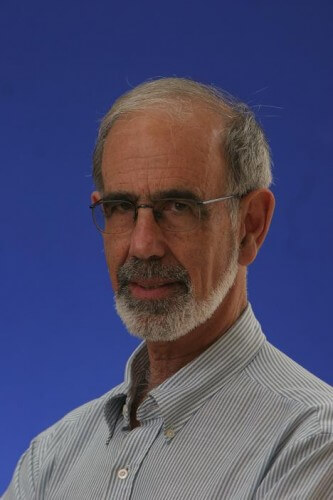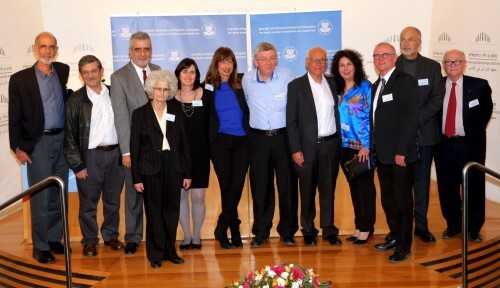The president, Prof. Neely Cohen: Your joining strengthens the Academy of Sciences

Today, Tuesday, December 8, 2015, nine senior scientists from Israeli universities will join the Israeli National Academy of Sciences, which will now number 115 scientists. The men and women of science who were chosen to serve as new lifelong members of the Academy of Sciences are: Yoav Binyamini, Professor in the Department of Statistics and Performance Research at Tel Aviv University, Yoram Billo, Professor Emeritus in the Departments of Sociology, Anthropology and Psychology at the Hebrew University of Jerusalem, Israel Finkelstein, Professor of Archeology and Ancient Near Eastern Cultures at Tel University Aviv, Ruth Gavizon, Professor Emeritus at the Faculty of Law at the Hebrew University of Jerusalem, Shafraira Golduser, Professor of Computer Science and Mathematics at the Weizmann Institute of Science, Avner Holtzman, Professor of Hebrew Literature at Tel Aviv University, Eli Keshet, Professor of Molecular Biology at the Hebrew University of Jerusalem, Adi Kimchi, Professor of Molecular Genetics At the Weizmann Institute of Science, Yosef Kost, a professor in the chemical engineering department at Ben-Gurion University of the Negev.
The president of the National Academy of Sciences, Prof. Neely Cohen, said that the addition of the nine senior scientists strengthens the Academy of Sciences with first-rate researchers. These researchers will assist the Academy in promoting the national and international goals it faces and in developing the extensive scientific activity in Israel in the coming years.
The nine senior scientists will join the Academy in a traditional and festive ceremony where they will be awarded Academy member certificates. The ceremony will take place on Tuesday, the eve of the second candle of Hanukkah, 8 in Kislu, XNUMX, December XNUMX at the Academy House in Jerusalem in an open session of the general assembly. The meeting will be opened by the president of the academy, Prof. Neely Cohen. After that, the chairmen of the divisions will introduce the new entrants who will give their first lectures at the academy. The nine scientists were elected at the Academy's general assembly on the recommendation of Academy members from its two divisions: the Natural Sciences Division and the Humanities Division.
The Israel National Academy of Sciences is the highest body in the scientific community in Israel. It was founded by law in 1961 with the aim of bringing together the best scientists in Israel, fostering and promoting scientific activity in the country, and advising Israeli governments regarding research and scientific planning of national importance.

Summary of CVs of the new members of the Academy of Sciences
Yoav Binyamini - full professor and head of the Natan and Lily Silver Chair for Applied Statistics in the Department of Statistics and Performance Research at Tel Aviv University. Prof. Benjamin and his research partners proposed the control of the rate of false discoveries as a new approach to statistical analysis of complex and large-scale studies, and developed appropriate methodologies. This approach is widely used in all branches of science. Prof. Binyamini's current research topics are the frequency problem in science and its solutions, model selection and inference after selection. In these fields he is the director of a center of excellence funded by the European Research Council.
Yoram Billo - professor emeritus in the departments of sociology and anthropology and psychology at the Hebrew University, served as the president of the Israeli Anthropological Association, as the head of the psychology department at the Hebrew University and as the head of the authority for research students there. The interdisciplinary nature of Prof. Billo's research work is characterized by an attempt to analyze the psychological processes and the individual behavior patterns studied in their community, socio-cultural and historical context. Prof. Billo's research has been published in six books and about a hundred articles in scientific journals. Won the Israel Prize in Sociology and Anthropology (XNUMX).
Yisrael Finkelstein - Professor in the Department of Archeology and Ancient Near Eastern Civilizations at Tel Aviv University and head of the Yaakov Alkov Chair of Archeology of the Land of Israel in the Bronze and Iron Ages. Prof. Finkelstein deals with the archeology of the Land of Israel and its surroundings during the Bronze and Iron Ages, combining the exact sciences and the natural sciences in the archeology and history of ancient Israel. He has conducted archaeological excavations and surveys at many sites in the Negev, the Sinai, the mountain region, and for the past twenty years his main field project has been conducted in Megiddo, in the Jezreel Valley. Prof. Finkelstein published 11 books and about 300 articles and edited 8 books.
Ruth Gavizon - Professor Emerita in the Chaim Cohen Chair of Human Rights at the Faculty of Law of the Hebrew University of Jerusalem. Her research interests include the philosophy of law, constitutional law, human rights and the place of law in society and the state. Her academic work was recognized by awards, including the AMT Award (2003), the Cheshin Award (2009) and the Israel Award (2011). At the same time, Prof. Gavizon maintained extensive public activity and was a member of many public committees, among them the Winograd Committee for the study of the events of the Second Lebanon War.
Shafraira Goldusser - Professor in the Department of Computer Science and Applied Mathematics at the Weizmann Institute of Science. She is one of the founders of cryptography and computational complexity theory. She won the Gödel Prize twice for inventing the concept of interactive proof and for her contribution to the theory of computational approximations, she is the recipient of the prestigious Turing Prize (for 2013). Prof. Goldusser is a member of the American Academy of Arts and Sciences, the American National Academy of Engineering and the American National Academy of Sciences.
Avner Holtzman - Professor of Hebrew Literature at Tel Aviv University, head of the Yaacov and Shoshana Schreiber Chair of Contemporary Israeli Culture. Prof. Holzman authored 14 books, edited about 40 other books and published hundreds of articles, essays and review lists in his field of practice - the Hebrew literature of recent generations. In his research he discusses the full range of Hebrew literature from the Enlightenment period to the present day. In 2013 he was elected as a member-consultant of the Academy of the Hebrew Language.
Eli Keshet - Professor of Molecular Biology at the Hebrew University of Jerusalem. His research focuses on the study of the vascular system and the complex process of their creation (angiogenesis). His research contributed greatly to the development of innovative approaches that harness the ability to control the production of blood vessels for medical purposes, among other things, to the development of treatments to inhibit the formation of blood vessels in cancerous tumors and blinding eye diseases. He won many awards for his research, including the A.M.T. (2006), the Rothschild Award (2014) and the Teva Company Founders Award (2014).
Adi Kimchi - Professor of Molecular Genetics at the Weizmann Institute of Science. Prof. Kimchi is a world-class leading researcher on programmed cell death and the control of the physiological balance of cells under stress conditions through autophagy. One of the genes that was isolated through a pioneering technique that she developed, DAPK, suppresses cancer development and damage to its activity is used as a prognostic marker in cancer tumors. Prof. Kimchi has published 160 articles and 22 book chapters. Among the awards she received for her scientific achievements: the Milstein Award (1999), Landau (1999), Serosi (2002), Lombroso (2006), Teva (2007) and the AMT Award (2012).
Yosef Kost - Professor in the Department of Chemical Engineering at Ben-Gurion University of the Negev, currently serving as the Dean of the Faculty of Engineering Sciences at Ben-Gurion University of the Negev and the head of the Avraham and Bessie Zaks Chair in Biomedical Engineering. Prof. Kost's field of scientific activity is the development of polymeric biomaterials for controlled and targeted release systems of drugs and genes. He has published four books, 37 book chapters, 110 articles and more than 50 patents. Prof. Kost is a foreign member of the American National Academy of Engineering.
More details on the membership cards on the Israel Academy of Sciences website

6 תגובות
Life
Why feed the troll?
Nostradamus
I say my words at the height of brevity. You're just embarrassing yourself.
Nostradamus
I have never heard such nonsense and it speaks to your detriment. Philosophy is, for example, the basis of all sciences. No scientific field can develop without a philosophical basis even if this basis is hidden. Poetry, literature are an essential part of every society. The tools for their investigation are different from those needed in the sciences. And this is the only way to follow the development of a company. The same is true in the social sciences. Perhaps you can explain the connection between an academic field and a political worldview, and this is me as a distinctly right-wing person.
Your whole attitude shows acute intellectual ignorance. I suggest all commenters ignore your comments. They don't deserve a response and it's a waste of the responders' time.
Turf science matters. The reason educated people commit immoral acts is because of the lack of moral education and that is grass science. For example, at the head of some of the Eisengroup members were doctors who murdered 1.5 million Jews. Ahmadingad is a professor of electronics and calls for the destruction of Israel.
Israel Finkelstein is considered an international expert in history and archaeology, and we haven't had such a level since biblical scholar Yehezkel Koipman and major archaeologist Yigal Yedin. He was also the swordsman, the book and the public service.
It's nice that Israel Finkelstein entered. Even if recently there was archaeological evidence for the size of the House of David, the refreshing direction created by the professor is important.
No physics professor entered. We have 3 very senior representatives at HLC - we installed 2 detectors there and at HLC they identified the Higgs boson and other discoveries, and many Israeli doctors are there. There is Mario Livio in a super-important observatory, we have Yakir Aharonov who deserves a Nobel Prize for the Aharonov-Boehm effect (maybe he is already a friend?) and the canvas is too short to contain. There is an expert in quantum computing from Hebrew, experts in electro-optics and quantum entanglement, in the physics of condensed matter, in electromagnetic fields. There are experts in the study of rationality from physics, and more.
Is there a bias of the committee that approves these appointments towards biology/medicine/chemistry mainly or is it a coincidence.
We installed a radar that detects radiation in the volume of an apple, from a distance of about 4000 km, which frees us from dependence on the data of a foreign power. Not giving up on it, but at the same time. A country should also respect its physicists.
Grass science is not a science but a breeding ground for leftist lunatics and Arab nationalists